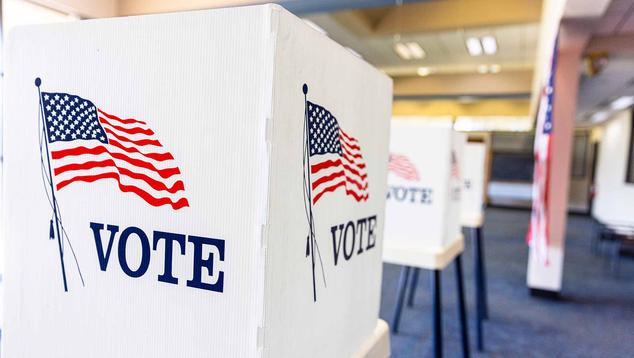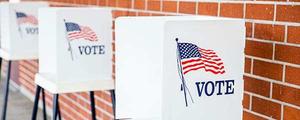This is the third in a series of brief overviews looking at what Americans want political candidates and elected officials to do about the key issues of the day. The first review looked at the consensus top problem leading into the election -- the economy and inflation. The second focused on three values issues -- abortion, critical race theory and gender identity. This review looks at three additional hot-button issues that appear in national campaigns as they have for a number of years -- gun control, immigration and climate change.
The important fact about two of these problem areas -- gun control and climate change -- is the degree to which most Americans approve of the various proposed remedies for the situations. Americans favor most gun control proposals tested except outright banning of handgun possession. And Americans favor a wide spectrum of policies aimed at addressing human-caused climate change, particularly those relating to the development of alternative energy and controls on emissions from traditional energy sources.
Attitudes about immigration are more complex. Americans want illegal immigration controlled. Americans are also wary of increased legal immigration, more so than they have been in several years. At the same time, Americans favor policies for dealing with immigrants who are in the U.S. illegally that allow them a pathway to stay here. And Americans do not appear to endorse busing or flying such immigrants to other states.
These issues have varying priority for Americans, but none appears to be as important to Americans at this time as inflation and the economy.
Gun Control
Gallup and other organizations have been measuring Americans' attitudes toward guns for decades, producing a huge amount of data in the process. The public's focus on gun control has fluctuated significantly over this time and has been particularly affected by highly publicized mass shootings.
Gallup's latest update of the most important problem facing the nation shows that 1% of Americans name gun control as the nation's top problem. But as recently as June of this year, that number was 8%, coming a month after the deadly school shootings in Uvalde, Texas. In March 2018, 13% named gun control as the nation's top problem, a month after the Parkland, Florida, school tragedy.
In similar fashion, Americans' attitudes about gun control have varied over time. At this point, I think the public's current opinions can be summarized in fairly straightforward fashion, as follows:
- Americans favor stricter gun control laws in general. Two-thirds of Americans in Gallup's latest polling support stricter gun control laws. Over half support passing new gun legislation rather than just increasing enforcement of existing laws.
- Americans, it follows, support most specific gun control measures as well. These include but are not limited to background checks for all gun purchases, a 30-day waiting period to purchase guns, and raising the age limit for purchasing guns to 21. Americans support a ban on assault weapons and on high-capacity ammunition magazines, but not on handguns. The data go on in this same vein.
It is notable that Gallup data show 44% of Americans say either that they own a gun personally or that there is a gun in their household, making this a large constituency with a direct interest in legislation that would affect their gun ownership.
In summary, if elected officials and leaders follow majority public opinion, they would enact a wide variety of new policies that would control the purchasing of guns.
Immigration
Gallup and others have been polling about immigration for decades. The importance of the immigration issue to the American public has ebbed and flowed over this time, just as has the actual number of immigrants who have come into the country -- legally and illegally -- since its founding.
Gallup's September update shows that 6% of Americans mention immigration as the nation's most important problem. This puts it as the fourth-most-frequently mentioned problem, behind government, inflation and the economy in general. This is low on a relative basis. There have been times in recent years (2018-2019, for example) when over 20% of Americans mentioned immigration as the top problem.
Other polls that ask Americans to rate the importance of immigration as an issue usually find it somewhere in the middle of the problems listed by pollsters, although the exact positioning varies from poll to poll.
Legal Immigration
One core focus of immigration policy is the nation's approach to legal immigration -- that is, decisions on how many people should be allowed (officially) to immigrate into the country (and from what countries and under what circumstances).
Immigration is certainly not a new issue for this nation of immigrants, and the nation's immigration laws have ranged from fairly wide-open to highly restrictive over the years.
Just as immigration levels have fluctuated, so has public opinion about its optimal levels.
Gallup's main trend question, tracked since 1965, gives Americans three choices -- increase immigration, decrease it or keep it at its present level. Given these choices, 38% of Americans in Gallup's most recent update say immigration should be decreased. This is higher than where it has been over the past few years but well below where it was for most of the 1990s and 2000s. (The rest of Americans are split between saying immigration should stay the same or be increased.)
A Gallup update last January showed that a majority of Americans are dissatisfied with current immigration levels, and the majority of those said it was because they want immigration levels decreased. Somewhat similarly, a recent NPR/Ipsos poll found that 46% of Americans oppose increasing the number of immigrants allowed into this country each year, with 39% in favor (the rest didn't have an opinion).
Public opinion on the hot-button issue of accepting refugees who are in harm's way in their native countries has varied widely over the years.
A Gallup analysis in April of this year reviewed the wide variations in support for refugees in Gallup polling stretching back to the years immediately after World War II. Most recently, over three-quarters of Americans favor allowing up to 100,000 Ukrainian refugees to come into this country. This support level is actually higher than at previous points in history when the public has been asked about refugees from other countries. Other polls confirm the current finding that Americans are positive about allowing Ukrainian refugees into the country. And a May CNN poll showed a modest majority favoring "allowing refugees from Central American countries to seek asylum in the United States."
This last point is relevant, given the actions of two big-state governors who are up for reelection this year (and who may be running for president in 2024) -- Florida Gov. Ron DeSantis and Texas Gov. Greg Abbott. Both have sent bus or airplane loads of immigrants who came to their states illegally to other, blue states (New York and Massachusetts in particular). A Reuters/Ipsos poll conducted in September showed plurality opposition to the idea of busing or flying immigrants who entered the U.S. illegally to other states.
Illegal Immigration
Illegal immigration is the most contentious aspect of this issue, most in the news and most likely to be the contested point in the coming midterm elections. Americans who are concerned about immigration overwhelmingly say it is illegal, not legal, immigration that worries them.
Americans' worry about illegal immigration can be measured in a number of ways. As my Gallup colleague Lydia Saad summarized last April, "The 41% currently worried a great deal [about illegal immigration] roughly ties the percentage found a year ago but is otherwise on the high end of Gallup readings taken over the past decade."
Other polling finds Americans willing to agree with rather dramatic descriptions of the situation. An Ipsos/NPR poll, for example, found that a slight majority of Americans believed that the U.S. was experiencing an "invasion at the Southern border," and an even higher percentage believed that the "U.S. is experiencing historic levels of migration, with immigrants flooding Southern border towns like never before."
What should be done about illegal immigration?
As noted previously, there is general and not unexpected support for various measures designed to reduce the incidence of people coming into this country illegally. For example, Gallup polling historically has found support for bolstering border security and increasing border patrol employees. And a recent Pew Research poll found that almost three-quarters of Americans said increasing border security was a very or somewhat important goal for the U.S., topping the list of the six immigration-related measures tested.
However, Americans do not support, and have not supported over the past six years, the idea of building a wall along the nation's Southern border.
Immigrants Already Illegally in This Country
It is estimated that over 11 million immigrants who entered illegally are living in the U.S. today. What to do about this situation has been the key question that has defied easy answers over the decades.
Most polling with which I am familiar shows that Americans favor looking for a way for people brought into the country illegally as children to stay in the U.S. Gallup polls have historically found support for a pathway for citizenship. Six in 10 Americans in a 2019 Gallup poll opposed a policy of "Deporting all immigrants who are living in the United States illegally back to their home country."
In summary, if elected officials and leaders follow majority public opinion on immigration, they would vigorously enforce existing laws that restrict illegal immigration into this country; seriously consider the issue of increased limits on the number of immigrants allowed into the country legally; and look for a pathway to citizenship for immigrants who are already illegally here.
Climate Change
Only 3% of Americans mentioned issues relating to the environment, pollution or climate change as the most important U.S. problem in Gallup's September update. Other polls rarely show that climate change is perceived as more important than a number of other concerns when Americans are asked to rate the importance of lists of the nation's problems.
What Should Be Done?
Whether or not climate change is Americans' highest priority, it is clear that the public favors the vast majority of ameliorative proposals put forward to address the issue. These include investments in alternative energy, more regulations on conventional power plants and pollution, investments in the transition to electric cars, and so forth. There is, in short, substantial approval from the American public for a wide range of proposed policies that would combat the effects of climate change.
Gallup earlier this year tested six policies that address greenhouse gas emissions and climate change. All six received majority support, ranging from 89% support for providing tax credits to Americans who install clean energy systems, like solar power, in their homes, to 59% for spending federal money to increase the number of electric vehicle charging stations in the U.S. Other policies receiving majority support included providing tax incentives for businesses to promote their use of wind, solar and nuclear power; setting higher fuel efficiency standards for cars, trucks and buses; establishing strict limits on the release of methane in the production of natural gas; and providing tax credits to individuals who purchase electric vehicles.
Gallup's historical polling has also shown similarly strong support for setting higher emissions standards and regulations on business and industry, automobiles, and homes, and spending more money to develop alternative sources of energy.
In 2021, Gallup found that two-thirds or more of Americans favored more emphasis on solar power and wind, while less than half favored more emphasis on coal, oil, natural gas and nuclear.
These general types of findings have been replicated across a number of different polls conducted by other organizations. (The recent proposal to ban the use of natural gas in newly constructed homes, however, finds lower levels of support.)
In summary, if elected officials and leaders follow majority public opinion, they would continue to enact and support policies that encourage the development of alternative sources of energy; continue to regulate emissions from traditional fossil fuel sources of energy; encourage electric cars; and in general, enact policies and take actions designed to mitigate the effects of climate change.




